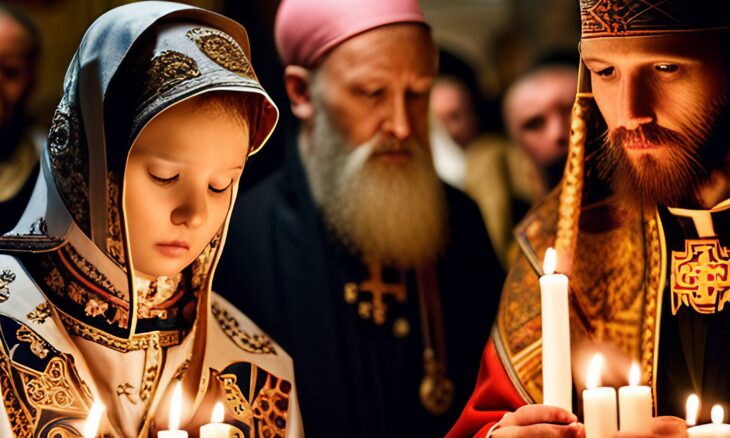The more I read "objections" (or in this case, "resistance") to the Orthodox faith, the more I come to realize that the Protestant framework is very tightly bound. By which I mean, writ large, Protestantism only makes sense if there are innate presuppositions that are not questioned.
An article making the rounds right now is a good example of this. Written by Jonathan Clark for "By Faith" magazine, it is entitled "Resisting the Lure of Catholicism and Orthodoxy."
I cannot, and will not attempt to, speak about how accurate or inaccurate his views on Catholicism are. The fact that he dumps us together with them is enough to give me pause. But as to Orthodoxy, he mixes some of the same old tropes with some fresh new ones, but still begs the same old questions.
Interestingly, he admits: "One student told me, 'It’s real. What they are doing is the stuff that matters, and the smoke machines at other churches just don’t compare.'"
The student told him what it was that attracted him to the Catholic or Orthodox Church (Clark doesn't specify which the student was referencing). Clark begins his reductionism by separating the attraction into two components -- what Clark calls the "aura" (or "smells and bells") and the "lore" (history). Having artificially set up his students' attraction to more historic traditions, Clark then pooh poohs the value of both.
When confronted with students interested in Catholicism or Orthodoxy, Clark says he draws them back to Scripture and explains how each tradition supposedly contradicts what the Scriptures say. And this is precisely the problem. First, he takes it as a given that his view on Scripture is correct. As evidence of the errors of Catholicism and Orthodoxy, he offers "justification by faith alone, Real Presence, the authority of Scripture, Mariology, and the adoration of the saints." He concludes "every time, students listen, but I can tell they remain unconvinced."
Well, is it any wonder if it is presented that way? "Justification by faith alone" is a Protestant construct. We in the Orthodox Church do not believe we are "justified" (as Protestants mean that term) by anything other than grace, or through anything other than faith. We explain that patiently to our catechumens. The problem is, Clark's formulation leaves no place for good works, and that is simply not a Christian, or a Scriptural, position.
I've said before, every Protestant worth his salt knows Ephesians 2:8-9 by heart:
For by grace you have been saved through faith, and that not of yourselves; it is the gift of God, not of works, lest anyone should boast.
For we are His workmanship, created in Christ Jesus for good works, which God prepared beforehand that we should walk in them.
So we are saved by grace, through faith, and for good works. And for the Orthodox, and I'd wager the Catholics too, this means salvation starts today. Salvation isn't something we hope for when we die. It begins right now. It begins in baptism. It begins in chrismation. It is strengthened and fed in the Eucharist, and it is restored in absolution. We're not sacramental in order to give an "aura" of piety. We are sacramental and pious because the sacraments are the very things of life itself! We don't do good works to "earn" salvation. We do good works because salvation itself is a life of good works. We are saved precisely for that purpose. So when we are justified by God's grace, through faith in Him, what does that mean? For the Christian, it means we are called to enter into a life, to literally participate in God Himself. What does it mean that good works were "prepared beforehand that we should walk in them," but that God prepared them so that we should actually walk in them? We aren't saved because of our good works. But we will not be saved without them either.
And justification is but one example. Take "the authority of Scripture." I'd wager we in the Orthodox Church read more Scripture in one Sunday than most Protestant churches read all week. That's not to denigrate them -- I admire the zeal with which evangelicals can bring up passages from memory, and take seriously the holy obligation to read the Word of God. The point is, we don't have a problem with the authority of Scripture. They have a problem with the authority of the Church, which is to say the Apostolic authority and therefore the authority of God. I'm not saying this to be mean, I'm saying it because it's true. And to deal with that, you have to deal with the anachronistic way in which sola Scriptura usually meets us in today's world. I'm not going to get into all of that here, because it is probably its own series of blog posts. The short version is this -- most Protestants (not all) view the Scriptures as the source for doctrine, but they were not written down until after the Church was established, and the Church decided which were canonical and which were not. To say all doctrine is decided by Scripture is to say that there was no doctrine before the Scriptures were written down, distributed, and canonized. And that is clearly not the case if you know anything about Christian history.
Not dissuaded by these problems, which I assume he does not recognize, Clark also does himself and his own tradition a disservice by dismissing the attraction to Orthodoxy and Catholicism. He suggested Presbyterians like himself could offer higher liturgical services and more smells and bells, but then immediately discarded the idea, saying "the average PCA church cannot (theologically and practically) offer the experience of the Mass or Hours; and second, it just feeds the problem. Like kids on a beach, the next pretty shell makes them drop all others." If he's right about that, and these young ones are really only delusional children seeking pretty shells, then I guess he has a point.
But if he's wrong......
And I definitely think he is wrong. We have a lot of young inquirers, catechumens, and converts in our little mission parish. We always ask "so what attracted you to Orthodoxy?" Not one of them has said "oh, it's so pretty!" Not one. They do tell me they began to study Church history and realized something in their own Christian formation was off. The non-Christians often tell me they see in Orthodoxy a holistic theology and practice that makes sense to them. Most of our converts are Protestant of some stripe or another, but from Pentecostal to Presbyterian, all of them see in the Orthodox Church a fullness that they find lacking elsewhere.
That's what drew me here. As I wrote in the second-ever post on this blog:
Over time, what we have seen in our months among the people of St. Stephens and what we have come to believe (or, rather, to recognize) is that she has a rightful claim to be the historic Church of the Apostles, the New Testament Church founded by Christ. We have therefore come to believe that the Orthodox Christian Church maintains the faith of the Apostles in the fullest, most authentic sense.
Reducing that to "the next pretty shell" is dismissive and insulting to those seeking the fullness of the faith. If Clark recognized this, then he wouldn't be so confused about why his arguments are rejected. He's insulting the very people he hopes to retain. But he apparently doesn't recognize this, which is sad.
It seems to me that we in the Orthodox Church spend a lot less time trying to woo people from the Presbyterian Church and other denominations than they spend trying to keep their people from coming to us. Every couple of years one of these articles pops up (the last one I noted was from a Lutheran and I wrote about it here). It's the same, scared, antsy presentation each time. "We can't compete with their beauty and mysticism and historicity, so how do we tell these rubes who are so easily distracted by shiny objects that it's wrong?"
It isn't a good look. It's no wonder it doesn't work. I wish people who want to critique Orthodoxy would take the time to actually put in the work and try to understand it. As long as they refuse to, the exodus will continue. Young people aren't stupid. Treating them as if they are is no way to convince them you're right.
For our part, we simply love them and try to be truthful with them. We fail, because we are sinners. I can only hope they appreciate the effort despite our failings. Because really, that is what Orthodoxy is about. Neither the aura nor the lore can replace love. And love begins by showing basic respect. Be who you are, be kind and loving, and stop worrying so much about what's wrong with us. If that doesn't work, no amount of railing against our beauty and history, as if those are bad things, is going to do any better.












